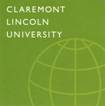
Claremont Lincoln University
3rd International Jain Conference: Business Ethics
Jain Business Ethics - A Global Review
An Opportunity For Global Leadership
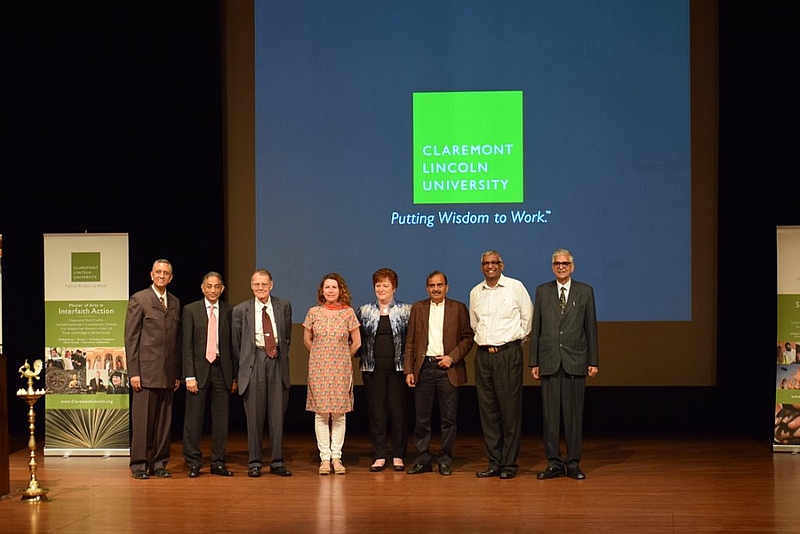
Pictured from left to right: Dr. Nitin Shah, Mr. Vallabh Bhansali, Mr. David Lincoln (Claremont Lincoln Benefactor), Laura Burgis (CLU), Eileen Aranda (CLU President), Prem Jain (President, JAINA), Atul Shah, D.R.Mehta
One of America’s most famous institutions, Claremont College (California), where none other than Professor Peter Drucker taught, was host to an international conference on Jain Business Ethics in early October 2014. The event was organised in cooperation with the Los Angeles Jain community, one of the leading and most dynamic communities in the whole of North America. I was fortunate to be an adviser to the conference and a keynote speaker, and met outstanding luminaries there and was able to have many discussions on this theme for which I am most passionate. I have written a comprehensive research paper on the subject, integrating faith, conduct, social impact and realtionship capital.
I would like to share with you my personal perspective on the event and the future direction it provides. One of the most moving statements made was when PETA founder Ingrid Newkirk, one of the most famous women in America, explained that when she was young, her only ambition in life was to ‘become a Jain’. This one statement demonstrated how important and prescient the Jain culture and heritage is for the world and its potential to realise compassion on this planet.
Business is one of the world’s most powerful institutions - in fact often more powerful than governments. The values by which it thinks and acts therefore has an influence on millions of people. Sadly, most business schools teach about profit-maximisation, and ethics if anything is a side-line. We had a variety of eminent speakers, ranging from Prem Jain, an Executive of CISCO and President of JAINA (the US national Jain federation), to Mr. Vallabh Bhansali, one of India’s top Investment Bankers, Ingrid Newkirk of PETA and Priya Kothari an economist and social entrepreneur.
The conference was organised by Claremont Lincoln Director Whitny Braun, and incorporated the Ahimsa Award which was presented to Padma Bhushan honoree Mr. D. R. Mehta, one of India’s most senior civil servants and pioneer of the Jaipur Foot Hospital, where nearly two million people have received free treatment for limb injuries. In his acceptance speech, Mr Mehta talked about the joy of selfless service, and the benefits he derives from practicing Ahimsa and compassion for those who have lost their limbs, self-esteem, indepedence and self-confidence.
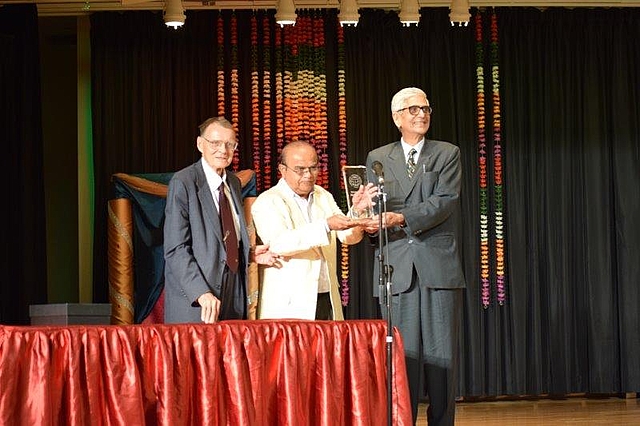
Mr. D. R. Mehta receiving the Claremont Lincoln Ahimsa Award from Mr Dilip Shah and Mr. David Lincoln
Dr. Nitin Shah was co-partner from the Los Angeles Jain community and played a key role in supporting and promoting this conference. Events ranged from a special dinner for conference speakers, to speeches and the Ahimsa Award dinner at the LA Jain Centre, and delicious vegan meals. I was also honoured to do a special session with postgraduate students on Ethical Leadership to speak on my life-journey, and given a special open invitation to return to Claremont Lincoln at any time in the future.
Mr. Manu Shah, CEO of MS International, spoke about how he and his wife Rika practically apply ethics in all their business transactions, and cares for their employees as if they were members of their family. MSI is the leading supplier of granite, marble, slate and other natural stone products from 36 different countries. Dr. Sulekh Jain, a JAINA past president and founder of the International Summer School for Jain Studies, spoke about the key Jain principles of Aparigraha and Achaurya, which mean respectively non-possessiveness (non-materialism) and not taking that which does not belong to you. He was upset that most business schools in India do not teach any ethics. Priya Kothari spoke of the new millennials generation, born after 1982, for whom values and meaning are very important to their lives, and this generation is not obsessed by money and greed but instead by ethics, compassion and community. She said that a silent revolution is happening, and this generation is going to transform our global future.
Mr. Vallabh Bhansali of Enam Securities gave a keynote address on how he reconciles Jain values in his own life by following the core principles and being focused on self-realisation. It is critical to think for yourself and be able to evaluate your own viewpoints and ethics he argued. Experience was vital to transforming lives, not theory, he explained. Mr. Bhansali also emphasised the importance of corporate transparency. Meditation and mindfulness were key to his business success - he practices Vipassana meditation - where silence helps to stay calm and unruffled by world affairs. Prem Jain of CISCO talked about how Jain values helped him stay humble and focussed in building innovation teams, and working hard in spite of the odds. He also did not give up on his Jain values throughout his career, and has taken an active leadership role in the North American Jain community. Eminent scholar and speaker, Dr. Cicovacki drew from global history and politics to show how power and economics were always more important than ethics - and this picture needs to be reversed if we are to build a sustainable future. Dr. Manish Mehta spoke of the Triple Bottom Line of Economics, Society and Environment - and why it is central that businesses respect all three bottom lines, instead of focusing on financial profit. Several references were made to the success of the International Summer School for Jain Studies, and its transformative effect on many teachers and students of Jain wisdom - an excellent new joint initiative has now been launched with Loyola Marymount University also based in Los Angeles led by Prof Chris Chapple.
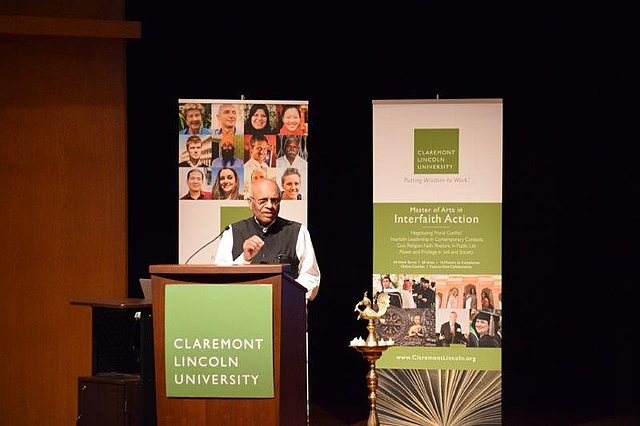
Visionary Jain Leader Dr. Sulekh Jain explaining key Jain ethics for business
In my speech, I chose to focus on Jain Social Enterprise, drawing on my experience of running Jain Spirit and Diverse Ethics, giving practical examples of how many diverse people want to work with the Jains to advance society and are not motivated by greed. I explained the vision of Jain Spirit magazine and the background work and infrastructure which was created to produce quality articles and images and pro-actively share Jain Values Globally. The closure of Jain Spirit was also the closure of this unique infrastructure and professional institution - a major loss to society. I showed the film by Bhavik Haria of our work with the RSPCA to help leaders embrace diversity and engage with ethical communities. The audience were moved by the film and the breadth of our work and achievements. Through Social Enterprise, Jains have a unique possibility of promoting Jain values AND earning a living. We need to take our culture out of our pockets and into the world. I also charted out a global philanthropic vision through which Jains could pro-actively share their culture and philosophy by setting up a foundation, a media organisation, an arts organisation, educational partnerships with leading institutions, and a think tank and policy consultancy. My vision was of building professional initiatives and institutions, staffed by full-time paid people, something which would last beyond any one lifetime. Institutions are ways by which philanthropists could leave a permanent legacy and put faith in the trust deed to ensure that money is spent along the right objectives, long after they have died. Through social enterprise, there is also great scope for revenue generation, which could make these catalytic investments sustainable.
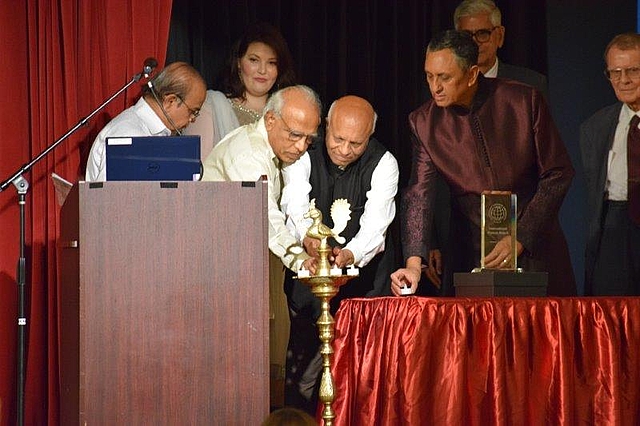
Lighting a candle of hope for an ethical future
In her closing address, Ingrid Newkirk, President of PETA, showcased a variety of ways in which compassion and non-violence could be practiced by business to remove the unnecessary cruelty and suffering of animals. She cited recent ventures and corporate initiatives which provide vegan foods and medicines, and developed new ways of creating nutritional food products which would not be based on any form of animal cruelty. To me, the story she painted of animal cruelty showed the impact of extreme human and institutional greed - which always leads to violence and aggressive behaviour. Through the pursuit of greed, business is being violent to animals, nature and society.
My reflections on the conference are that we opened a huge pandora’s box of a subject, where this event was an important start. The whole field of Business Ethics requires leadership and sustained effort, and the Jains have skill in both these areas, but it requires pro-active drive. Jains should consider such work as a way of repaying the legacy of their cultural heritage from which they have profited. Harvard Business Review, the premiere journal in business, is not leading any paradigm shift in the ethic of business, and even in American business schools, business ethics are taught as a sideline and not integrated into the mainstream.
We did not directly address questions like:
- Is it paradoxical to be a ‘rich Jain’? What does Aparigraha mean in practice?
- Are we in control of our wealth, or is our wealth controlling us?
- How important is detachment to modern business?
- What should be a Jain ethical framework for big business?
- Is tax evasion and avoidance practiced in the Jain community? If so, is this legal, ethical and fair or unfair and illegal? What is the community’s stake in these hidden profits?
- Do Jains understand and value the political economy which supports their businesses? What obligation do they have to wider government and society?
- How can we ensure Jain business case studies are featured in Business textbooks and research journals, and taught in business schools all over the world? Is there a media strategy for Jain business ethics?
- What educational linkages should we nurture with academic institutions?
- What is the business value of promoting Jain ethics?
- What value do Jains place on cultural intelligence, and the need for them to share this publicly and creatively?
- What are the ethics of windfalls like capital gains from stock market booms, property investment and hedge funds? What should we do with 'unearned' income, where no sweat or labour is involved?
- How do we reconcile the profound differences between running a business and running a charity - the goal of business is to make profits and the role of charity is to spend surpluses to uplift society? How can business play a direct role in transforming society - are Jain businesses socially responsible and accountable?
- The recent booms in the Indian stock market, property market and US hi-tech stocks have created massive windfalls for many Jains. These gains are not transparent, and many are located offshore. What is the community’s stake in these surpluses? Why are they not being used to build unique educational and cultural institutions? Why is it that in the whole of India, there is not a single quality museum explaining the profound Jain culture, wisdom and heritage?
- What role do Jain businesses play in building an island fortress for the community, where people are not able to engage with or understand Jain culture, in spite of being very hungry to learn?
- Should we be inventing an annual 'business pratikraman' during the Paryushan festival, encouraging entrepreneurs to reflect on their business footprint, evaluating both successes and areas for improvement?
- How can business skill be applied to community institutions such that they raise revenue, provide a quality and professional service, and remain sustainable?
- What is our vision for young Jains and the world they will inherit?
- Have we reflected enough on the impact of leaving all our estates to current and future family members? Are we afraid to face the materiality of death?
- How can we increase our trust for charitable activities and enterprises?
- Are Jain entrepreneurs aware of the unique ways in which their culture and values can be shared and promoted to a global audience, and the skills for doing so which already exist in our community?
Not all of these questions are easy or comfortable. But we must ask them if we are to be a community of integrity, and a people who understand the unique cultural heritage we have been endowed with. We need to rise to the challenge of upholding and sharing this culture, and use our businesses as fund-raising projects for community initiatives. Whilst there are some examples of business leaders with such vision, there is also fragmentation, a lack of vision and various degrees of greed and selfishness. Many Jain entrepreneurs I know do not understand the basics of Jain philosophy and do not see the need to practice it in their own lives.
Among the audience, Dr. Manohar Shinde of Dharma Civiliastion Foundation found the speakers very inspiring and is keen to develop further a new institutional vision for creating a paradigm shift. Professor Daniel Ostas from the University of Oklahoma found it a very inspiring event, and felt that the Jains are indeed a very knowledgeable and skilled leadership community.
I very much hope that such conferences are repeated in places like Mumbai, Nairobi and London, as Jains have a powerful voice in business, and need to be reflexive about its social, economic and environmental impact. JITO in India has been active in getting Jain businesses to trade with one another. But of course we need to do much more than meet and talk - we need to act to transform global values and ethics, and set a leading example. Is that asking for much? Not according to the millennial generation, for whom walk is more important than talk.
I would like to take this opportunity to thank all the Jain entrepreneurs who cooperated with my research on this project, Claremont Lincoln University and the Jain community of Los Angeles for being excellent hosts.
Please share your own comments and links in the discussion section below - in this way, the whole world can hear from your experiences. Detailed videos of all the speeches have been recorded and will be available after editing in due course. Once launched, they will be linked to this article.
 Dr. Atul Keshavji Shah
Dr. Atul Keshavji Shah